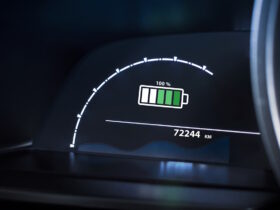Want to know if an electric vehicle will really save you money compared to petrol? Our comprehensive EV vs petrol cost calculator instantly shows you the real-world running costs, helping you make an informed decision about your next vehicle purchase. PS – It works for diesel, too. Just select your fuel price to suit.

⚡ EV vs ⛽ Petrol Calculator
Updated November 2025 with latest fuel prices for electric vs petrol and electric vs diesel
If you’re here in a hurry to calculate electric car vs petrol costs:
Electric cars typically cost 2-8p per mile vs 15-20p for petrol cars. Most UK drivers save £800-1,500 annually by switching to electric.
Understanding the True Cost: Electric vs Petrol in 2025
The debate between electric and petrol vehicles has evolved beyond environmental concerns to become a serious financial consideration for UK drivers. With petrol prices hovering between £1.40 and £1.60 per litre and electricity costs varying from 7p to 80p per kWh depending on where and when you charge, understanding your actual running costs has never been more critical.
EV vs Petrol Cost Comparison – Real UK Prices
Our EV vs petrol calculator takes the complexity out of these comparisons, providing instant, personalised cost analysis based on your specific driving patterns and local energy prices. Whether you’re considering your first electric vehicle or wondering if it’s time to switch back to petrol, accurate cost calculations are essential for making an informed decision.
The cost difference between electric and petrol vehicles has reached a tipping point in 2025. With UK electricity averaging 27p per kWh and petrol hovering at £1.50 per litre, the financial case for electric vehicles has never been stronger.
The stark reality: Electric vehicles cost just 7-8p per mile to run on standard home tariffs, compared to 17-20p per mile for petrol cars. That’s a 60% reduction in fuel costs. For drivers using off-peak EV tariffs at 7p per kWh, costs plummet to just 2p per mile – an extraordinary 90% saving versus petrol.
But raw numbers don’t tell the complete story. Public rapid charging at 65-80p per kWh can push EV costs closer to petrol levels, highlighting the importance of home charging access. Similarly, diesel vehicles achieving 50+ MPG narrow the gap, though rarely match EV efficiency.
How We Calculate EV vs Petrol Running Costs
The fundamental challenge in comparing electric and petrol vehicles lies in their different measurement systems. Petrol efficiency is measured in miles per gallon (MPG), whilst electric efficiency uses miles per kilowatt-hour (mi/kWh). Our calculator bridges this gap by converting both to a common metric: cost per mile.
For petrol vehicles, we calculate your cost per mile by dividing the price per litre by your vehicle’s miles per litre efficiency. A car achieving 40 MPG at £1.50 per litre costs approximately 17p per mile. Electric vehicles work similarly but with different units: at 3.5 miles per kWh and 27p per kWh electricity, you’re looking at roughly 7.7p per mile – less than half the petrol cost.
But these headline figures don’t tell the whole story. Real-world factors significantly impact both calculations, which is why our calculator includes options for charging efficiency losses, journey types, and annual mileage patterns.
Using the EV Petrol Calculator Effectively
The calculator offers two primary comparison methods, each designed for different planning needs. The journey comparison mode helps you understand costs for specific trips, whilst the annual comparison reveals long-term financial implications of your vehicle choice.
Electric Car Calculator: Compare Running Costs vs Petrol & Diesel
Start by adjusting the fuel price sliders to match your local rates. The petrol slider ranges from £1.20 to £1.80 per litre, covering everything from supermarket fuel to premium motorway services. For electricity, the range spans from 7p per kWh for overnight EV tariffs to 80p for rapid motorway chargers.
Most users find it helpful to run multiple scenarios: best-case (home charging at off-peak rates), typical daily use (mix of home and public charging), and worst-case (predominantly rapid charging). This range of calculations provides a realistic picture of your likely costs rather than an optimistic estimate that won’t match reality.
Why Electric vs Petrol Costs Vary So Dramatically
The cost difference between electric and petrol driving isn’t fixed – it fluctuates based on numerous factors that our calculator helps you explore. Time of day matters enormously for electric vehicles. Charging overnight on a dedicated EV tariff at 7p per kWh costs roughly 2p per mile, whilst rapid charging at 80p per kWh pushes costs above 20p per mile – potentially more expensive than petrol.
Your driving style affects both fuel types differently too. Petrol vehicles achieve their best economy on steady motorway runs, whilst electric vehicles excel in stop-start urban driving where regenerative braking recovers energy. Our calculator’s efficiency inputs let you adjust for these real-world variations.
💡 Key Cost Factors to Consider
- Electricity Tariffs: Standard domestic rates (24-27p/kWh) vs EV-specific tariffs (7-9p/kWh off-peak)
- Charging Location: Home charging vs workplace vs public networks
- Journey Types: Urban efficiency gains for EVs vs motorway efficiency for petrol
- Seasonal Variations: Winter heating reduces EV range by 15-30%
- Maintenance Costs: EVs typically 30-40% cheaper to service
Breaking Down the Numbers: Real-World Examples
Let’s examine typical scenarios using current UK averages. A family doing 10,000 miles annually in a petrol hatchback achieving 40 MPG at £1.50/litre spends approximately £1,704 on fuel. The same mileage in an electric vehicle averaging 3.5 mi/kWh, charging 80% at home (27p/kWh) and 20% publicly (50p/kWh), costs around £857 – a saving of £847 per year.
For high-mileage drivers covering 20,000 miles annually, the savings double to nearly £1,700 per year. Over a typical four-year ownership period, that’s £6,800 in fuel savings alone, often offsetting much of the premium price of an electric vehicle.
| Scenario | Annual Mileage | Petrol Cost | EV Cost (Mixed) | Annual Saving |
|---|---|---|---|---|
| Low Mileage | 5,000 miles | £852 | £429 | £423 |
| Average Driver | 10,000 miles | £1,704 | £857 | £847 |
| High Mileage | 20,000 miles | £3,408 | £1,714 | £1,694 |
| Business User | 30,000 miles | £5,112 | £2,571 | £2,541 |
The Impact of Charging Strategies
Smart charging strategies can dramatically reduce electric vehicle running costs. Our calculator’s electricity price slider reveals how timing your charges affects your wallet. Charging exclusively during off-peak hours at 7p per kWh reduces costs to just 2p per mile – roughly one-eighth of typical petrol costs.
Many EV owners develop a charging routine that minimises costs: overnight charging at home for daily commutes, workplace charging where available, and rapid charging only when necessary for longer journeys. This mixed approach typically results in an average electricity cost around 20-25p per kWh, still delivering substantial savings over petrol.
Hidden Costs and Additional Considerations
While our EV versus petrol calculator focuses on fuel costs, several other factors influence total ownership costs. Electric vehicles benefit from reduced maintenance requirements – no oil changes, fewer brake replacements due to regenerative braking, and fewer moving parts to service. Annual servicing costs typically run 30-40% lower than equivalent petrol vehicles.
Tax implications favour electric vehicles significantly. Zero road tax (VED) for pure electric vehicles saves £190 annually compared to an average petrol car. Company car drivers see even greater benefits, with Benefit-in-Kind rates at just 2% for electric vehicles versus 25-37% for petrol equivalents.
Insurance presents a mixed picture. Electric vehicles often cost 10-20% more to insure due to higher purchase prices and specialist repair requirements. However, this gap is narrowing as insurers gain experience with EV claims and repair costs stabilise.
Charging Infrastructure and Convenience Costs
Installing a home charger costs £800-1,200 after government grants, but transforms the ownership experience. Our calculator assumes you have home charging available, but flat dwellers relying entirely on public charging face different economics. Public charging at 40-80p per kWh significantly erodes cost advantages, though still typically beats petrol prices.
Time costs matter too. Filling a petrol tank takes five minutes; fully charging an EV at home takes 6-8 hours (though you’re sleeping, not waiting). Rapid charging takes 20-40 minutes for 80% charge. Factor these convenience differences into your decision alongside pure financial calculations.
Future-Proofing Your Decision
Energy prices fluctuate, but long-term trends favour electric vehicles. Petrol prices face upward pressure from declining North Sea production and carbon taxes. Electricity prices, whilst volatile, benefit from increasing renewable generation and smart grid technologies that reward flexible charging.
The government’s 2030 ban on new petrol car sales will affect resale values. Electric vehicles may hold value better as demand increases, whilst petrol cars could depreciate faster as they approach obsolescence. Our calculator’s five-year projection helps you understand these longer-term implications.
🔮 Factors Affecting Future Running Costs
- Electricity Grid Evolution: More renewables could mean cheaper, cleaner charging
- Fuel Duty Changes: Government may increase petrol taxes to fund infrastructure
- Battery Technology: Improving efficiency will increase miles per kWh
- Charging Networks: Competition should reduce public charging prices
- Smart Charging: Vehicle-to-grid technology could earn money from your EV
Making Sense of Your Calculator Results
When interpreting your EV petrol cost calculator results, focus on your specific circumstances rather than generic averages. If you have solar panels, your effective charging cost might be near zero during sunny periods. If you regularly drive to Scotland or Cornwall, factor in motorway rapid charging costs for those journeys.
The break-even point calculation assumes an £8,000 premium for an electric vehicle – typical for mainstream models. Premium brands may have smaller or larger differences. Adjust your expectations accordingly, and remember that monthly finance payments might matter more than total cost for your budget.
Consider sensitivity analysis: how would your costs change if petrol hit £2 per litre? What if electricity prices doubled? Our calculator lets you explore these scenarios, helping you understand the risks and opportunities of each fuel type.
Regional Variations in Running Costs
Location significantly impacts your EV versus petrol economics. London drivers benefit from Congestion Charge exemption (£15 daily) and Ultra Low Emission Zone exemption, potentially saving £4,000+ annually for regular commuters. Rural drivers might face limited charging infrastructure and longer journeys, reducing EV advantages.
Scotland offers additional incentives including interest-free loans for home chargers and extensive ChargePlace Scotland network access. Wales provides similar support through their charging network. Northern Ireland faces unique challenges with limited rapid charging infrastructure affecting cost calculations.
The Environmental Cost Factor
While our calculator focuses on financial costs, environmental considerations increasingly influence purchasing decisions. Electric vehicles produce zero local emissions, improving air quality particularly in urban areas. Even accounting for UK electricity generation mix, EVs produce approximately 70% less CO2 per mile than petrol vehicles.
As the grid decarbonises with more wind and solar generation, this advantage grows. By 2030, electric vehicles could produce 80-90% less lifetime CO2 than petrol equivalents. Some buyers consider this environmental benefit worth paying a premium, whilst others see it as an additional bonus alongside cost savings.
Calculator Methodology and Assumptions
Our EV charging versus petrol calculator uses real-world data to ensure accuracy. Petrol prices come from weekly government surveys, whilst electricity rates reflect current Ofgem price caps and typical EV tariff offerings. We update these baseline figures monthly to maintain relevance.
Efficiency figures represent typical real-world performance rather than optimistic manufacturer claims. The 10% charging loss option reflects academic studies showing actual grid-to-battery efficiency. Similarly, our petrol MPG figures account for real-world driving conditions, not just laboratory tests.
The calculator assumes consistent driving patterns throughout the year, though seasonal variations exist. Winter heating and summer cooling affect both vehicle types, though EVs show greater sensitivity to temperature extremes. Consider running calculations for summer and winter scenarios separately for the most accurate annual picture.
Frequently Asked Questions About EV vs Petrol Costs
Q: How accurate is the EV vs petrol calculator?
Our calculator provides estimates within 5-10% of actual costs for most users. Real-world variations depend on driving style, weather conditions, and exact tariffs. Use it for comparative analysis rather than precise budgeting.
Q: Should I include charging equipment costs?
The calculator focuses on running costs. Add £800-1,200 for home charger installation to your initial investment calculations. This typically pays back through convenience and lower charging costs within 2-3 years.
Q: What about battery degradation?
Modern EV batteries lose approximately 2% capacity annually. After eight years, expect 85-90% of original range. Our calculator uses current efficiency figures; adjust the mi/kWh figure downward for older vehicles.
Q: How do plug-in hybrids compare?
PHEVs offer flexibility but complexity. Calculate separate costs for electric and petrol miles based on your charging habits. Most PHEV owners find 60-70% electric running delivers optimal savings.
Q: Can I use this calculator for diesel cars?
Yes, simply select your fuel price. It doesn’t matter if your car is petrol or diesel provided you select the right price, MPG, and tank capacity.
Taking Action on Your Calculations
Once you’ve used our EV petrol calculator to understand potential savings, consider these next steps. Test drive both electric and petrol vehicles to understand performance differences. Check local charging infrastructure using Zap-Map or similar apps. Investigate specific EV tariffs from your energy supplier or consider switching providers.
For company car drivers, speak with your fleet manager about electric options and salary sacrifice schemes. The tax advantages often outweigh any remaining fuel cost concerns. Private buyers should explore finance options, as monthly payments might favour EVs despite higher purchase prices.
Remember that vehicle choice involves more than just running costs. Consider your environmental priorities, driving experience preferences, and lifestyle requirements alongside the financial calculations. Our calculator provides the cost clarity needed for informed decision-making, but the final choice remains uniquely yours.
✅ Action Checklist
- Run calculations for your actual annual mileage and driving patterns
- Check availability of off-peak electricity tariffs in your area
- Map local charging infrastructure for your regular journeys
- Calculate total cost of ownership including purchase price and depreciation
- Consider test driving both options to understand practical differences
- Factor in local incentives like clean air zones or parking benefits
Conclusion: Making the Numbers Work for You
The transition from petrol to electric vehicles represents one of the most significant changes in personal transport history. Our EV versus petrol cost calculator helps navigate this shift by providing clear, personalised cost comparisons based on your specific circumstances.
For most UK drivers, electric vehicles now offer compelling financial advantages, particularly when combined with smart charging strategies and appropriate tariffs. The calculator reveals that annual savings of £800-1,500 are realistic for average drivers, with higher-mileage users seeing even greater benefits.
As infrastructure improves and battery technology advances, the economic case for electric vehicles strengthens further. Whether you’re an early adopter or cautious observer, understanding the true costs helps you make the right decision at the right time. Use our calculator regularly as prices change, and you’ll always have current data to inform your choice.
The future of motoring is undoubtedly electric, but the transition timeline varies for each driver. Let the numbers guide your decision, but remember that the best choice balances financial, practical, and personal priorities. Our EV vs petrol cost calculator provides the financial clarity – the rest of the decision remains uniquely yours.
Further information:



